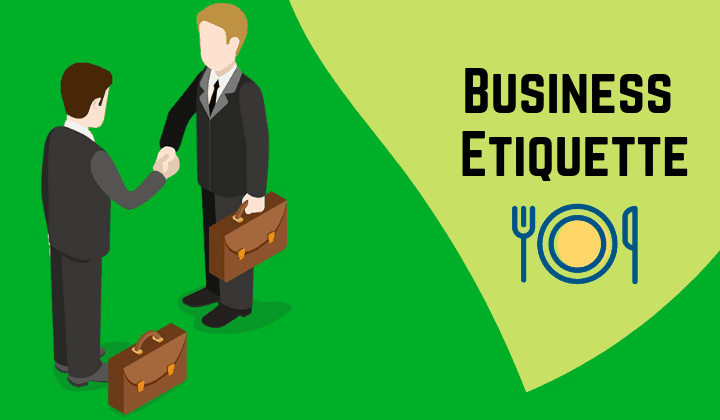“People will forget what you said. People will forget what you did. But people will never forget how you made them feel.”- Maya Angelou.
Remember, what we say and what we do has an impact on how people feel. Learning to effectively deploy this in business defines your success, stagnation and failure.
Moreover, every business on this planet functions under one principle: Customer first. While it is important to win clients, it is equally essential to retain them.
Further, retaining customers is the key to maintaining your business. The same principle applies to business associates as well. Such associates can range from the well-heeled banker to supplier and the mailman who calls daily.
Therefore, to succeed at business, your staff and you require great business etiquette.

Definition of business etiquette
Business etiquette also goes by the moniker business etiquettes. However, English language does not stipulate any plural form for the word. Hence, the term etiquette is generally taken as correct.
Online Business Dictionary defines business etiquette as “Expected behaviors and expectations for individual actions within society, group or class. Within a place of business, it involves treating coworkers and employer with respect and courtesy in a way that creates a pleasant work environment for everyone.”
Further, business etiquette is also defined as a set of manners that are needed or practiced in profession. Sometimes, they are vaguely termed customs or traditions.
Every person following that trade or profession is expected to follow these manners. Indeed, violating accepted manners or customs is considered uncivilized. Additionally, such violations can cause loss of business.
However, the term business etiquette is often considered vague: While it does imply how you deal with your customers, associates and others, it is also useful within the office.
Business etiquette helps foster responsible and respectful behavior among staff and also sets pace for better communications. This translates into higher productivity and efficiency.
Business etiquette makes everyone feel comfortable. It helps forge relationships and builds loyalty. In fact, business etiquette is extremely vital for your business, regardless of its size. Success or failure of your business depends heavily upon etiquette you and others display to one-another and to others.
Business etiquette and corporate culture
Business etiquette is integral part of corporate culture. Rather, it is considered the very foundation of corporate culture. Understandably, corporate culture sans business etiquette is ersatz.
Business etiquette and corporate culture are braided. Meaning, one cannot exist without the other.
A brief on corporate culture
Briefly, corporate culture is defined from the values, ethics and common objectives of all staff and their employer. It reflects in diverse ways: Staff uniforms, livery, office décor and decorum. In turn, these are highly palpable within the office and dealings with customers and business associates.
Further, the elegance shown by staff in interaction within office and external entities is part of corporate culture. This demeanor is also business etiquette.
Importance of business etiquette
Indisputably, etiquette is vital utility for every business. There are several reasons for this emphasis on business etiquette:
- Business etiquette helps foster better communication within office and externally.
- Further, business etiquette helps develop standard business practices at all levels of your corporate echelon.
- The key component of sales, after-sales service, customer grievance redress, client retention, loyalty building, trouble-shooting and marketing rely solely upon business etiquette. Products or services offered by a company are secondary over business etiquette.
- Excellent business etiquette boosts staff confidence and creates healthy working ambience.
- Companies with great business etiquette are less prone to lawsuits and adverse publicity.
- Helps better understanding of foreign trade partners, associates and customers.
Types of business etiquette
Understandably, this is sufficient to mystify you. There are several types of business etiquette that you need to practice and implement, for having a successful business. Alternatively, great business etiquette can also help you stay ahead of peers and competitors. Broadly, you need to apply business etiquette in five main spheres:
- Email etiquette
- Social media etiquette
- Customer service etiquette
- Business associate etiquette
- Workplace etiquette
- Telephone etiquette
- Visitor etiquette
- Business party etiquette
Additionally, learning foreign business etiquette is also crucial, if your firm has trade links with companies abroad. Moreover, these foreign etiquettes assume greater significance should these associates come from countries that have advanced but very alien cultures.
Email business etiquette
Nowadays, emails constitute bulk of every business communications. Hence, it is imperative to inculcate excellent business etiquette while sending or responding to emails. Good business etiquette for email includes
- Avoid mass mailing. Such emails usually end up in spam. Further, they indicate you are only interested in making money, with scant respect for individuals.
- Explicitly mention subject of your email. This leaves no space for ambiguity and clearly informs the recipient, what the email is about.
- Mention the recipient’s full name with appropriate suffix. This personalizes the email. Add Mr., Ms, Mrs., before the name. It is polite. Follow this with ‘Sir’ or ‘Madam’ according to the receiver.
- Do not write long paragraphs. Remember to limit your paragraphs to two or three sentences only.
- Be concise yet precise in your message. Meaning, do not beat round the bush. Come directly to the point and mention what you wish to say.
- Express gratitude. You could be dealing with a petulant customer or business associate. Do not take umbrage. Instead, thank the sender and acknowledge the email. End by thanking the sender for cooperation and time spent on reading your email. This dents the sender’s fury. Follow this practice for your regular business emails too.
- Never add CC and Bcc unless extremely essential. Every recipient prefers to deal with a single point of contact. Adding more people to an email tends to widen the scope of respondents and can inadvertently confuse the recipient.
- Above all, immediately acknowledge every email you receive. This implies your company is proactive. Further, it builds a great confidence level with the sender.
- Add your digital signature if possible. Also, mention your name, designation and contact details clearly while concluding the email. While mentioning phone numbers, also state timings when you can be called.
- Provide a link to your website, tacitly directing the recipient to explore your company’s offerings.
You can distribute a standard template for official email among your staff. This ensures consistency in email communication across the board.
Social media etiquette
Thanks to proliferation of Facebook and Twitter, an increasing number of companies are now taking to social media. Firstly, Facebook allows you to post fun stuff on your corporate page while Twitter helps reach out to clients and business associates speedily. It also helps companies listen to their customers- both satisfied and unhappy.
- Judicious use of smiley. Meaning, use a smiley that suits the comment. Try to avoid use of ‘Laugh’ or ‘Angry’ smiley since it can offend the person posting the comment. Worse, you may draw ire from the entire community for using inappropriate smiley.
- Respond politely to every adverse comment. Never get into the proverbial ‘tit-for-tat’ mode while handling clients or business associates on Facebook. Similarly, never go all out to appease someone who has made an adverse or negative comment about your offerings. Remember, your comments can go viral within minutes and severely sully your brand.
- Respond at the earliest. This is the secret of staying ahead of competition. Every person who comments wants a response at the earliest. Doing so increases the chances of getting more ‘likes’ for your Facebook page.
- Get genderless. Obviously, you lack the means to known whether a person making comments is female or male. Therefore, respond in a manner that appeals to all genders.
- Never tarnish competitors and rivals. Nor should you allow your ‘friends’ to post negative remarks about them. Delete such comments or posts, as soon as you notice them. You could unwitting fall prey to a tactic by rivals or land in a war of words.
Customer service etiquette
Another integral part of business etiquette is how you deal or interact with customers. Here, it is essential to bear in mind that customer is the core of your business. Admittedly, some customers are cantankerous and hard to please. Yet, that is no reason for showing disrespect.
- Greet all customers with a smile. Guide them to a seat if possible. Offer a drink of water. Such etiquette calms down even the most rancorous visitor.
- Be very patient. Not all customers are there with grievances. Some may have excellent suggestion that can help your business flourish.
- Speak amicably. Meaning, never get into an argument with a customer either on or away from your premises.
- Avoid raising your voice at all costs. The person can feel humiliated and will bay for revenge. You could end up with a lawsuit on your hands. It also sends ugly signals to others, including your staff. Should you encounter a boisterous visitor, lead away to privacy of a room and chat amicably.
- Offer a beverage such as coffee, tea or a soft drink. Invariably, this tact cools down even the most incensed customer.
Business associate etiquette
Generally, this means the entire system of how you deal with your business associates. Of course, no businessman or executive will treat a business associate shabbily. However, modern businesses require a chic, proactive approach. Here is some vital business etiquette essential nowadays
- Fix meetings at mutually convenient venues, date and time.
- Be present at the venue well in advance.
- If you are playing host, ensure that stationery, water bottles and cups as well as other essentials are in place.
- Ensure that all files and documents relevant for the meeting are available at the venue.
- Have someone meet, greet and escort your business associates to the meeting room. If possible, do so yourself. Greet your associates with a bouquet.
- Never keep your business associates waiting.
- Ensure you are not disturbed by phone calls.
- If a business associate drops by uninformed, ensure you meet them without much delay.
Workplace etiquette
Charity, education and all the good stuff starts at home. So does workplace etiquette. Unless your staff and you have excellent workplace etiquette, you cannot enforce them effectively for business. Workplace etiquette stems from office decorum. Here are few things you can do for improving workplace etiquette:
- Inform all staff about ‘do’s’ and ‘don’ts’ at the office. This means, strict ban on cuss and swear words.
- Encourage a system of greeting one-another, especially when one arrives for work or leaves for the day.
- Create an atmosphere of confidence, where employees at all echelons can share views openly, without fears of retribution.
- Nip unhealthy gossip.
- Maintain a proper dress code. Smart attire is fine but also ensure your staff do not arrive in sagging clothes that stink of stale sweat.
- Promote avenues for healthy interaction. Never allow personal disputes to erupt into verbal duels at workplace
Telephone etiquette
A telephone is important extension of your business. It allows people from afar to connect immediately. The advent and booming popularity of mobile phones has not diminished the significance of a landline phone. Every major company has landline phones where business associates and customers can contact.
Usually, your telephone operator will come well versed in etiquette. However, the problem begins once the call gets passed.
- Ensure the call is handled promptly, even if the called person is not on desk.
- Apologize for the called person’s absence but ask if the caller requires any assistance.
- Wherever possible, ask the caller’s name and contact number and assure the called person will respond back at the earliest.
- Find if you can be of any assistance or whether the call can be diverted to another staff who could help.
- Always answer with a polite ‘hello’ instead of a curt ‘hi’ or other word.
- Be very selective in use of your words. Sometimes, it could be your boss calling for some work.
Visitor etiquette
Visitors to your office need not necessarily be your business associates or customers. Mailman, delivery staff, maintenance crew and motley other people also visit your office almost daily.
These visitors are equally vital for your business as the millionaire banker. Often, some such visitors may lack proper etiquette or manners while dealing with some senior executive. This is no reason to fly off your rocker. Instead, here are things you can do:
- Have the visitor led to a person concerned with these works.
- Make the visitor feel welcome to your office by offering a seat and a drink of water, if possible.
- Engage such visitor in small talk for a minute or so. Remember, such talk greatly serves to relieve the stress of a mailman or electrician.
- Never dismiss such visitors as menial. Instead, accord them the same welcome as you would a business associate.
- Never admonish a worker for some work left incomplete or wrong repairs. Hurting their ego will not serve your purpose. Au contraire, it can prove counterproductive.
Business party etiquette
Once again, this includes a list of do’s and don’ts, whether you are playing host or attending a business party. Interestingly, lots more work gets done informally during business parties rather than routine meetings.
To make your attendance or hosting a success, here is some good etiquette:
- Always send an RSVP if invited for a business party, regardless of whether you attend.
- Ask for RSVP when sending business party invitations.
- Business party invitations usually stipulate a dress code. Ensure that you adhere to this dress code if invited. Specifically mention the dress code if you are playing host.
- Ensure you mention whether the invitation is for your business associate only or includes the spouse. This will save embarrassment to both, host and guests.
- Invite people who share common interests and can provide life to your party. Calling people with diverse interests causes formation of small groups. This leaves some guests feeling lonely or in wrong company.
- Have a very affable staff watch over your bar and buffet. This is not to watch over your guests but ensure that drinks and food flow is well maintained and smooth. A staff with condescending looks, however effusive, can be a deterrent to enjoyment.
- Never segregate staff based on their positions, during a party. This is a clear signal that your firm discriminates between high and low rung employees. Such feelings can adversely impact your organization’s image. It is party time and everyone has right to enjoy.
Business etiquette by culture
Meanwhile, the etiquette we have outlined is general and useful across the world. However, in recent years, a lot of emphasis is being laid upon etiquette of various ethnicities and cultures. Understandably, this is positive fallout of globalization of the world’s economy.
The most complex business etiquette occurs in Asia. Rightly China, India, Japan, South Korea and Thailand are fast emerging as major business destinations.
Countries of West Asia, especially the six Gulf Cooperation Council states Kingdom of Bahrain, State of Kuwait, Sultanate of Oman, State of Qatar, Kingdom of Saudi Arabia and United Arab Emirates have opened their doors to the modern world.
These Asian countries have the most diverse business etiquette. For example, embracing your male business associate is considered normal in the Arab world but is frowned upon in South Asia.
Declining an offered cup of tea is of no significance in India or Thailand. However, in Japan and South Korea, it can mean an outright insult.
This website features articles on major business etiquette from Asia. Look for
- Japanese business etiquette
- Chinese business etiquette
- Arab business etiquette








